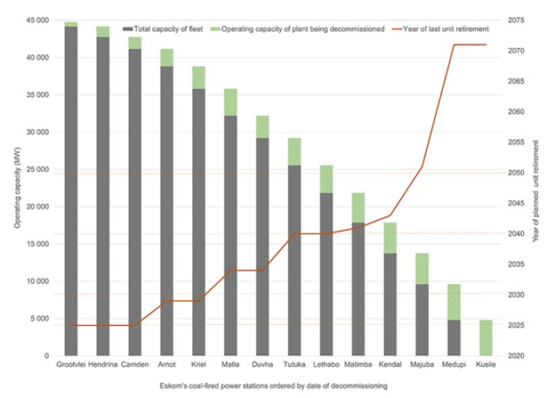Cape Town — Coal Mine closures will have a detrimental effect on mining communities and would lead to millions of job losses, as the country looks to make a new energy transition.
Data published from the Journal of the Southern African Institute of Mining and Metallurgy showed that five new coal powered plants and 15 coal mines will likely close by the year 2030, with another four plants and 23 mines will close by 2040. This would leave to 2.5 million job losses, mainly in Mpumalanga, Moneyweb reported.
The five coal powered plants would remove 8.9GW from the grid, followed by a further 14GW when another four power stations are likely decommissioned by 2040,
“The impact of mine closure on the 2.5 million residents of host communities will be significant, particularly as levels of income, employment, and education are already very low and many municipalities are in financial distress,” the authors said.
“The South African approach to the just transition needs to take local realities into account, and the narrative must support an effective”
There are currently 66 coal mines operating in South Africa, with 32 owned by private companies. The five largest companies – Seriti, Sasol, Exxaro, Thungela and Glencore – produce 77% of the country’s coal. Together, they produced 231 million tons of coal in 2022, generating earnings of R28 billion and employing nearly 91 000 people. Transnet’s difficulties meant a loss in export revenues totalling R22.7 billion in 2022.
Mpumalanga and KZN house most of coal mining communities, where 37% live below the poverty lone, and a further 39% are unemployed. In the villages dependent on coal mining, the figure jumps to 57% living below the poverty line.

“Mine closures will impact not just these households but the municipalities reliant on income from mine employees and companies. National Treasury data shows fruitless and wasteful expenditure of R7 billion in these host municipalities in 2021.” the research said.
“The poverty and poor living conditions of thousands of people in coal mining host communities is distressing and is not being adequately addressed by the government.”
SA’s shift from fossil fuels to renewable energy is inevitable. The reliance on coal-fired power has led to dramatic rises in electricity tariffs and damaged the economy, while renewable energy investment around the world has produced twice as many jobs as investments in fossil fuels.
The solution proposed includes improving governance across affected municipalities. A just transition is possible, provided the country pursues a dual energy generation strategy (coal and renewables), collaborates with other countries in the region to apply comparative advantages, and finds the “political will and integrity” to enable the investment and development required for the just transition to manifest.
Follow African Insider on Facebook, Twitter and Instagram
Picture: Pixabay
For more African news, visit Africaninsider.com
Compiled by Matthew Petersen


